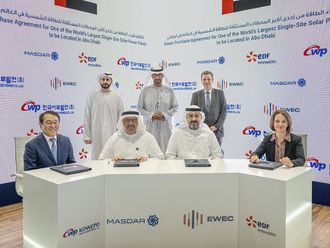Abu Dhabi: The development of sour gasfields has become a priority given the need for more gas-fired power stations, gas injections to boost oil production and the continued development of the petrochemical sector, Badr Al Mohammadi, manager of the Projects Division at the Gas Processing Directorate of the Abu Dhabi National Oil Company (Adnoc), said.
Al Mohammadi was speaking at the 10th International Conference on Sour Oil and Gas Advanced Technology 2014 (Sogat 2014), held on Tuesday under the patronage of Adnoc and other international partners at the Beach Rotana Hotel, Abu Dhabi.
Leading international gas experts gathered to debate the latest technologies used to convert sour gas into sweet gas. The UAE and the Gulf region require sweet gas to support ongoing infrastructure, power and petrochemical requirements.
The Adnoc Group has supported the Sogat event since its inception, with Al Mohammadi saying this year was no exception, given progress made in the sour oil and gas sectors across the world. In the UAE, the BAB project has made strides in this regard, with Al Mohammadi saying he was heavily involved.
“The development of sour gasfields here has become a priority. However, there are many challenges to be overcome and better understood, particularly in terms of appropriate project management, the design and implementation of facilities that contribute to successful gas processing, improved emission controls that adhere to international standards, enhancing and managing HSE systems, particularly when it comes to emergency equipment such as appropriate breathing equipment in hazardous and life threatening situations, novel and developing gas processing techniques especially suited to fields with significant [carbon dioxide] CO2 levels, appropriate materials selection throughout the total system process to avoid corrosion activities, to name a few, all of which require strong and robust quality control and careful and timely observation and management,” he explained.
“I am pleased to inform you that, given the astute management by the International Advisory Committee, presentations throughout this conference will highlight these issues and give all of us a unique chance to discuss and debate their implications.”
He said that the committee is to be congratulated on their final selection of papers that cover most if not all of the areas of concern for those who work in the surface aspects of sour field management.
“This programme gives us a timely opportunity to review the latest international findings and through its medium and reputation, a first class opportunity to gain from the technology transfer that will evolve from the 30 papers to be delivered from experts from no less than 14 countries,” Al Mohamadi concluded.












